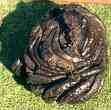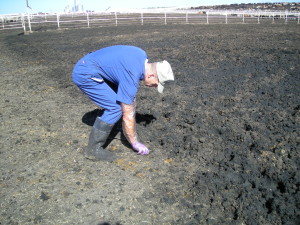Researchers in Regina are using cow manure set atop a roof to study how E. coli
is able to survive through winter.
“We have been made fun of,” Dena McMartin, a professor at the University of Regina, told CBC News recently, noting what punsters have said about the  project. “I have a crappy job. This is called poop on the roof, or elevated excrement.”
project. “I have a crappy job. This is called poop on the roof, or elevated excrement.”
“Quite frankly, the results could have some fairly serious implications for farming, meat handling [and] water processing,” McMartin said.
The research, with support from federal grants, started four years ago.
The setting for much of the work has been the flat-top roof of the Classroom Building at the U of R and the farm fields of southern Saskatchewan.
Researchers have been to the farms to collect and analyze cow manure. Then samples are set out on the roof, open to the elements, to see what happens.
The results are compared to manure observed in the farm fields.
“Part of why we’re doing this in Saskatchewan is because we have this very extreme climate, and quite frankly, if E. coli can survive here, they’ll survive  anywhere,” McMartin said.
anywhere,” McMartin said.
The researchers have already determined that when the temperature drops to below -15 C, no E. coli is found in their roof-top samples.
However, in the field samples the researchers found the bacteria — while dormant in the cold — returned to life as the temperature warmed up.
